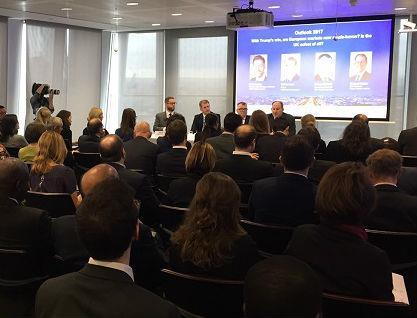Donald Trump's victory in the US presidential elections has downgraded Brexit from major problem to minor event, one which could even be regarded as an opportunity, delegates have heard at the PropertyEU Outlook 2017 – Europe & the UK briefing. Nicol Dynes reports.

'Trump has deprioritised Brexit,' said Michael Walton, CEO of Rynda Property Investors told the packed briefing, held on Thursday at the City of London offices of BNP Paribas Real Estate. Foreign institutions, that had stopped dead in their tracks after the surprise referendum result, have abandoned their wait-and-see attitude and are now investing again.
'Some large Asian institutions in July decided not to invest in the UK and to look at the US instead, but now that the UK has dealt with Brexit as well as it could have they have decided to look back at the UK after all,' said Will Rowson, partner at Hodes Weill & Associates. 'Part of that interest is due to currency, as a 20% discount is a good place to start, but the fact is that positive sentiment towards the UK has actually increased after Brexit.'
Post-referendum, 'there is a renewed appetite from Middle Eastern and Asian investors, who see things differently and do not regard Brexit as a huge issue,' said Simon Williams, head of investment at BNP Paribas Real Estate. 'They have confidence that the UK will remain a stable place for them to park their cash.'
The surprising resilience of the market has even persuaded new or long-absent investors to put their money in UK property. 'Due to the weak pound the German funds are showing a renewed appetite for the UK, which is very encouraging as they are usually extremely canny and look for value for money,' he said.
'Some people have been disappointed by how well the UK has done after Brexit,' said David Inskip, director, EMEA Strategy and Research at CBRE Global Investors. 'The opportunists who has swooped down thinking of finding bargains have gone away again. There have been positive net inflows in funds, but no correction and no bargain basement deals.'
The UK economy continues to do well, outperforming both France and Germany, the government seems stable with no threat of early elections and real estate values are ending the year higher than before the vote.
Despite these positives, pointed out Sukhdeep Dhillon, senior economist at BNP Paribas Real Estate, there is still much uncertainty as to what Brexit will actually entail. 'Various outcomes are still possible,' she pointed out. 'A hard Brexit, meaning no preferential trade agreeements for the UK, some tariffs and a loss of passporting rights, could force institutions to relocate or to scale back their London operations, and this could cause a drop in occupier demand.'
The new office development pipeline in central London could also run ahead of recent rates of net absorption, and a drop in demand could see vacancy rates rise and rental values start to fall. The fact is that 'nobody knows the shape and scope of changes to come,' said Williams.










